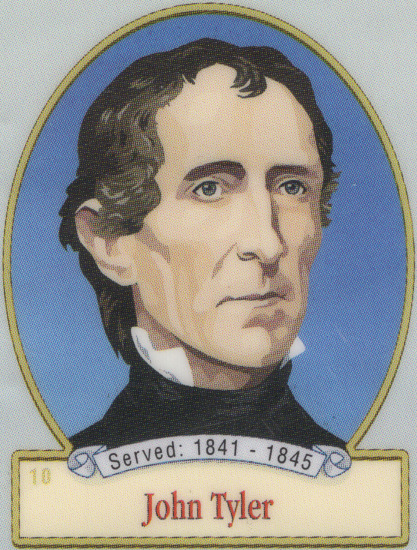#President Tyler
Explore tagged Tumblr posts
Text

"I do not believe that the sober and reflecting people of Virginia would have been so far dazzled by military renown as to have conferred their suffrages upon a mere soldier -- one acknowledged on all hands to be of little value as a civilian."
-- John Tyler, making plain his opposition to Andrew Jackson during the 1824 Presidential election, in a letter to Henry Clay, March 27, 1825.
The 1824 election was a four-way race between Jackson, Clay, John Quincy Adams, and William H. Crawford. No candidate won a majority of Electoral College votes, so the election was thrown to the House of Representatives for the first (and, so far, only) contingent election for the Presidency in American history. Only the top three candidates in Electoral College votes advances to a contingent election, so Clay was eliminated from the process, leaving a three-way race between Jackson, Adams, and Crawford. Adams won the election with help from Clay, who had signaled his support for Adams which shifted states from Jackson to Adams in the House vote. When Adams then chose Clay to be his Secretary of State (which had been the stepping stone to the Presidency for most of the country's early history -- four of the first six Presidents had been Secretary of State), there were accusations of a "Corrupt Bargain" suggesting that Clay's support for Adams was part of a quid pro quo in return for the State Department. In his letter to Clay, Tyler, who had worked hard against Jackson's election, made it clear that he and his fellow Virginians didn't believe the accusations against Clay while implying that, even if they did, they didn't have a problem with it.
#History#Presidents#Presidential Elections#Presidency#Elections#Election History#John Tyler#President Tyler#Andrew Jackson#President Jackson#General Jackson#Henry Clay#John Quincy Adams#JQA#President Adams#Contingent Election#1824 Election#Election of 1824#Contingent Election of 1824#William H. Crawford#Presidential Campaigns#Electoral College#Constitution#Political History#Politics#House of Representatives#U.S. House of Representatives#Congress#Congressional History
25 notes
·
View notes
Text

My artist friend (from well remembered hits such as nixon's nails and bongfield,) has created a piece commemorating the @presidenttyler blog's one year anniversary. Happy birthday Mr. President.
13 notes
·
View notes
Text
2 notes
·
View notes
Text
Since like 11* people on Instagram either commented or SU'd when I posted this in a story, this image proved compelling enough to share elsewhere.

This is a real video that you can watch here
I immediately had too many thoughts to keep to myself so these are my notes:


*it used to say 9 but then more people SU'd
#thomas jefferson#james madison#andrew jackson#jaxler#matty van#martin van buren#william henry harrison#john tyler#babycakes tyboy#james k polk#zachary taylor#millard fillmore#franklin pierce#james buchanan#abraham lincoln#ulysses s grant#james garfield#chester arthur#woodrow wilson#warren harding#calvin coolidge#herbert hoover#damn that's a lot of people to tag#acctag: presidents#effort posts
99 notes
·
View notes
Text
Imagine Kate trying to date other guys after joining the Tornado Wranglers, but the one time she brings home a nice guy to meet her mom, Cathy is immediately like
"...Wait, where's Tyler? This isn't Tyler. Does Tyler know about this guy?"
"Steve's a nice guy, Mom. Please just give him a chance."
"Why? Is he sweet and charming, and does he adore you, and will he give me a dorky-looking t-shirt with a cartoon of his face on it?"
"MOM." "Don't 'Mom' me, missy. I've spent too long filling up Pinterest boards with ideas for you and Tyler's wedding for you to waste your time on somebody else. Seriously, Kate, who are you kidding...?"
#cathy carter is president of the kate x tyler fanclub :)#kate x tyler#she will accept no substitutes as a son-in-law at this point#there can only be one#kate carter#cathy carter#tyler owens#twisters#twisters 2024#twisters movie
122 notes
·
View notes
Text





A surge of 3AM energy and exam anxiety pulled me into a drawing tumble—
Thank God it was this project it pushed me to though.
I will admit the clothing situation is a little…. Weird. All the paintings I find have the presidents in black (except thankfully that one painting of Jackson I found.) and I’m trying to create ✨variety✨ without completely creating new clothes for them.
So it also turned into color tests of some sort?
(But in the case of Polk I was inspired by @doodle-blight’s design for him.)
-H
#andrew jackson#martin van buren#william henry harrison#john tyler#james k polk#antebellum#art#hopperart#traditional art#artists on tumblr#us presidents
25 notes
·
View notes
Text


Does this answer your question?
#teen wolf#derek hale#sterek#derek/stiles#derek and stiles#stiles and derek#stiles/derek#tyler hoechlin#Kate Argent Hate Club#I’m the President#he’s such a good actor#does this make sense
84 notes
·
View notes
Text
In love with drawing SSA monster AU!🥰
credit to @doodle-blight for character designs and art styles!they are wonderful🥹
Glowing cynocephaly James Monroe btw (designed by me)




#star spangled after life monster AU#james monroe#vampire jackson#andrew jackson#franklin pierce rat#franklin pierce#thomas jefferson#john tyler#us presidents#art#history
17 notes
·
View notes
Text
I drew the US Presidents ⁉️⁉️
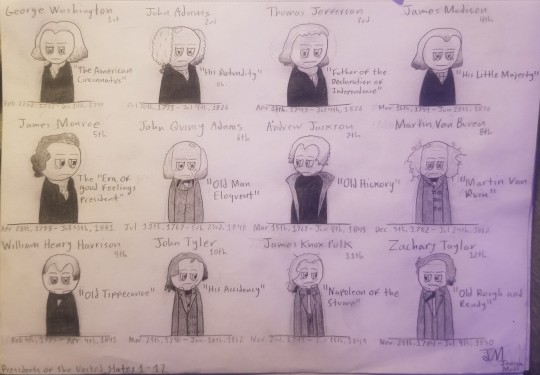
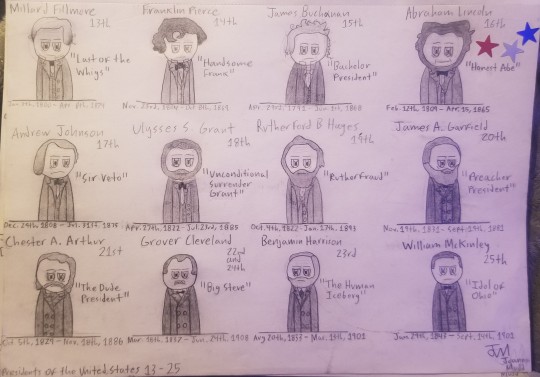
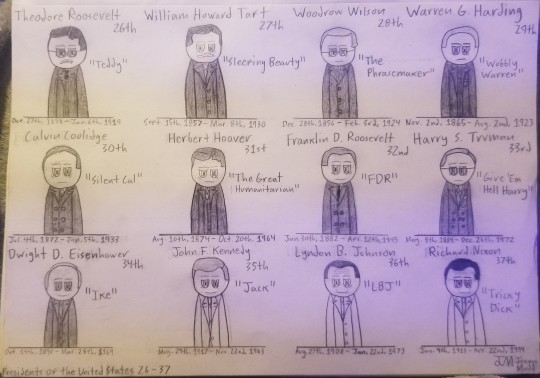
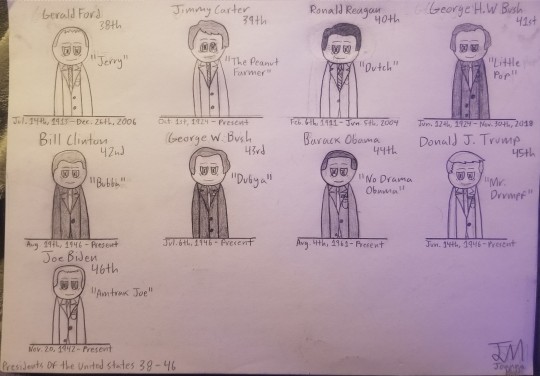
Constructive criticism is not allowed ⁉️⁉️(Because I only draw for fun lol, not mad or anything tho)
I couldn't tag anymore presidents 💔💔
#u.s. presidents#george washington#john adams#thomas jefferson#james madison#james monroe#john quincy adams#andrew jackson#martin van buren#william henry harrison#john tyler#james k polk#zachary taylor#millard fillmore#franklin pierce#james buchanan#abraham lincoln#andrew johnson#ulysses s grant#rutherford b hayes#james a garfield#chester a arthur#grover cleveland#benjamin harrison#william mckinley#theodore roosevelt#william howard taft#woodrow wilson#warren g harding#calvin coolidge
52 notes
·
View notes
Text
A Deadly "Peacemaker" and Unlikely Matchmaker: The Worst First Date Ever.
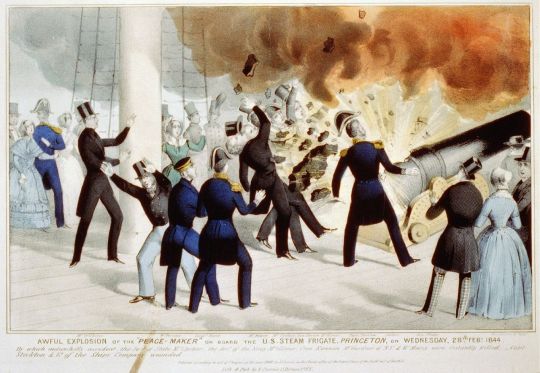
On February 28, 1844, Dolley Madison was far removed from her time as First Lady of the United States, but still held on to her spot as Washington's Greatest Hostess. She was the widow of a bona fide Founding Father, James Madison -- the 4th President of the United States and principal author of the U.S. Constitution and Bill of Rights -- but he had left the White House almost 27 years earlier and died in 1836. However, Dolley -- now 75 years old -- remained a darling of the Washington social scene. Though she often struggled financially, Dolley Madison continued entertaining guests in the nation's capital and helped organize social gatherings around the city, acting as a sort of guest hostess wherever she visited and whenever she was invited -- and she was invited everywhere. Now, as the first auguries of spring began their awakening in-and-around Washington, D.C., Dolley helped plan a cruise down the Potomac River on the newly-built USS Princeton -- a showcase vessel for the United States Navy which happened to be one of the most advanced warships of its time. Nearly 70 years after the Declaration of Independence, Dolley Madison was still the life of the party and an ideal person to help plan a celebration aboard the USS Princeton, just as she'd been doing throughout the entire life of the young American nation.
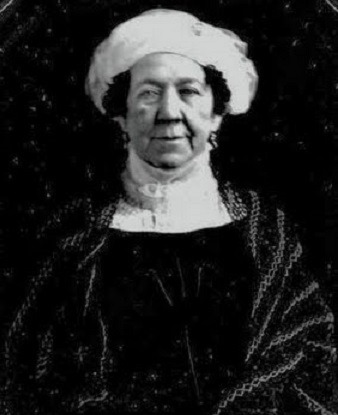
[Dolley Madison, daguerreotype by Mathew Brady in 1848, four years after the Princeton explosion.]
Launched just six months earlier, the Princeton was the U.S. Navy's first propeller-driven warship and its Captain, Robert Field Stockton, was proud of his charge. A cruise to demonstrate the ship's speed, capabilities, and weaponry to the Washington elite would be advantageous to the Navy's growth and to Captain Stockton's ambition. Besides Dolley Madison and the Princeton's crew of 178 sailors, the ship welcomed over 350 guests, including dignitaries such as Secretary of State Abel Upshur, Secretary of the Navy Thomas W. Gilmer, Secretary of War William Wilkins, Postmaster General Charles A. Wickliffe, Senator Thomas Hart Benton, and other diplomats and members of Congress. The most celebrated guest on the Princeton that day, however, was President John Tyler, who had also invited a young woman he had been romantically interested in, Julia Gardiner, and her father, David Gardiner, an influential New York lawyer and former State Senator.
Everyone on board the Princeton had underlying reasons for taking the cruise down the Potomac. For some, it was to see the Princeton for themselves. For others, it was because it was the place to be for politicians and diplomats on that February day. Some took the cruise for the opportunity to observe others, and some took the cruise in order to be noticed. The big draw, however, was a chance to see the Princeton's two large guns -- weapons so big and powerful that they were given their own names: the "Oregon" and the "Peacemaker" -- being fired. Both of the guns were impressive, but the "Peacemaker" was an amazing spectacle. At the time, it was the largest naval gun in the world. The ship was so new and the "Peacemaker" was so potentially devastating that, as of the day of the Princeton's cruise down the Potomac, the weapon had been fired no more than five times, according to Captain Stockton.
In February 1844, John Tyler was entering the final year of a contentious, controversial, and accidental Presidency. Elected as Vice President alongside William Henry Harrison in 1840, Tyler spent only a month in the Vice Presidency before President Harrison died in office. On April 4, 1841, Tyler became the 10th President of the United States, but his succession was not a smooth one. Harrison had been the first President to die in office and the Constitution was not specifically clear about Presidential succession. To many, including everyone in President Harrison's Cabinet, Tyler was still the Vice President and only assumed the duties of the Presidency, not the title or the privileges (such as living in the White House). At his first meeting with the men Harrison had appointed to the Cabinet, the Cabinet all but insisted that they would rule by committee and that Tyler had no more power or influence than, say the Postmaster General (which was a Cabinet-level position until 1971). Many Americans felt that Tyler was merely "Acting President," and that he was to defer to the will of the Cabinet on all issues.
Tyler vehemently disagreed and the manner in which he assumed office set a precedent that was followed by all future Vice Presidents and was eventually cemented into the Constitution. Tyler declared that he was not the Vice President or the "Acting President," but that Harrison's death had propelled him directly into the office of President of the United States to serve out the remainder of Harrison's elected term with the same powers and duties and privileges that come with the office. Tyler moved into the White House and, when his Cabinet balked at his assumption of power, he accepted the resignation of everyone but his Secretary of State, Daniel Webster (Webster eventually resigned in 1843).
President Tyler's troubles did not disappear once Harrison's hand-picked Cabinet departed or after Tyler settled into the Executive Mansion. The slavery question was tearing the nation further and further apart by the day. When Tyler won election in 1840 as Harrison's Vice President, he did so as a member of the Whig Party, but when it came down to Tyler's personal political ideology he was all over the political spectrum. As a younger man, he supported Thomas Jefferson and the Democratic-Republicans and he supported Andrew Jackson during Jackson's first term before Tyler became a Whig. Upon his Vice Presidential nomination, there were questions about Tyler's Whig credentials, but the Whigs needed a strong Southern balance on the ticket and accepted Tyler. But now that General Harrison was dead, President Tyler's independence frustrated his party, which felt that he was not sufficiently Whiggish. With former President Andrew Jackson out of the picture and retired in Nashville, and with Whigs in control of Congress and the White House, the party attempted to establish another Bank of the United States. The Whig Congress pushed through a bill creating a new Bank of the United States, but President Tyler definitively broke ranks with the party that had nominated him for national office and vetoed the bill. Twice. So, just months after assuming the Presidency, Tyler was expelled from the Whig Party and remained a President without a party until he left the White House in 1845.
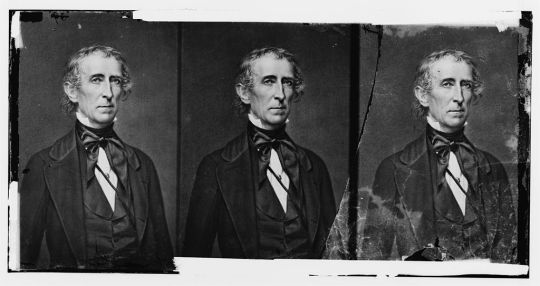
Now, on a warm day at the end of February 1844, Tyler was thinking about whether or not he would support the annexation of Texas. The President also thought of romance. In September 1842, Tyler's wife, Letitia, died in the White House after suffering a stroke. Tyler was still grieving when he began courting Julia Gardiner in January 1843. Tyler had met Julia while his wife was still alive, but he didn't become smitten with her until after his wife's death. Tyler and Julia kept their relationship guarded from the public and the President was even secretive about it to his (very large) family. Part of the reason for his reluctance to be open about his feelings was because Letitia had only been dead for a few months when he started dating Julia. However, a bigger reason was Julia's age. When they began dating, Julia Gardiner was just 22 years old. The 52-year-old President was wary about how his children (he and Letitia had seven children who lived to maturity) would feel about him dating a woman who was five years younger than his oldest daughter.
The age difference also worried Julia's family. Julia Gardiner was the daughter of David Gardiner, a wealthy New York lawyer and former New York State Senator. She was born in 1820 on an island in the Long Island Sound named after her family, and had everything that she wanted or needed while growing up on Gardiner's Island. Julia was beautiful and much in demand by the eligible bachelors of the East Coast. After meeting President Tyler, Julia first tried to reject his advances, but she was certainly intrigued by the powerful and charming Virginian. For his part, Tyler was madly in love with Julia and he first proposed to her in late-1843. Julia's mother did not approve of her daughter marrying a man 30 years older than Julia, so Tyler didn't get an answer. By inviting Julia and her father to accompany him on the USS Princeton, John Tyler hoped to show David Gardiner that he could impress the wealthy New Yorker and demonstrate that he could be a wonderful husband to Julia.
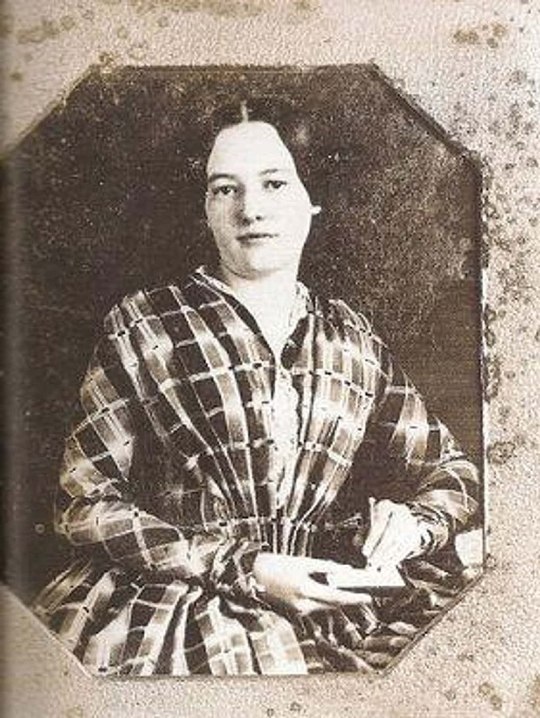
[Julia Gardiner Tyler, around the time of the Princeton explosion and her marriage to President Tyler, c. 1844]
••• Guests gathered at the Washington Navy Yard as ferries transported them across the Potomac River to Alexandria, Virginia, where the USS Princeton was anchored and ready for the afternoon cruise down the Potomac. As dignitaries boarded Captain Stockton's ship, they marveled at the size of the two guns on deck and examined every inch of the 164-foot warship. Music was provided by the United States Marine Band -- "The President's Own" -- and food was served below deck as the Princeton began its leisurely cruise down the Potomac. As guests explored the Princeton and watched the historic sites on both shores of the Potomac pass by, the massive "Peacemaker" gun was fired to the delight of everyone on the ship. The rounds fired by the powerful "Peacemaker" were capable of traveling up to three miles. As the warship cruised down the river the rounds that were fired were aimed at ice floes in the distance which were breaking apart as the afternoon sun warmed the Potomac. The cruise continued, with men mostly on the deck and pretty much all women below deck where food and drinks flowed freely, conversation was genial, and some of the guests were gleefully singing and clearly enjoying themselves.

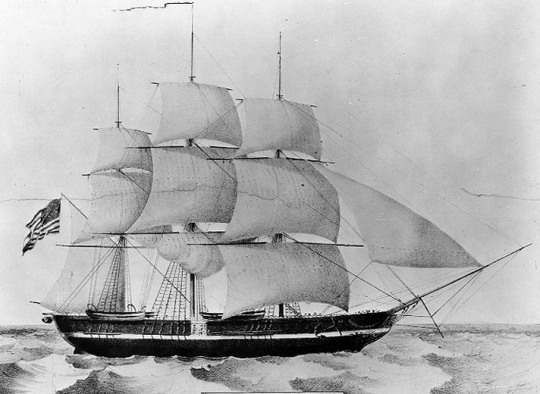
When the Princeton reached Mount Vernon and George Washington's sprawling estate came into view, the ship fired another round from the "Peacemaker" in tribute the first President and then turned around for the return trip to Washington, D.C. The Princeton's passengers had gathered below deck for celebratory toasts and to listen to the impromptu singing concert taking place in the salon. At around 4:00 PM, some of the men requested a chance to witness the "Peacemaker" being fired again, but Captain Stockton demurred, telling the men, "No more guns tonight." However, one of the men who wished to see the "Peacemaker" fired once again was Thomas W. Gilmer, the man who had become Secretary of the Navy just 10 days earlier -- a man who just happened to be Captain Stockton's superior. Gilmer's wish was something akin to an order to Captain Stockton, so Stockton headed to the deck and had the gun prepared to be fired once more.
Many of the men began heading upstairs to witness the firing of the "Peacemaker" while the women mostly remained below deck and continued with their songs and conversations. President Tyler was heading up the gangway plank towards the deck when he was told that his son-in-law, William Waller, the husband of his daughter Elizabeth, was about to sing one of Tyler's favorite songs. Instead of heading to the deck, the President headed back into the salon and was handed a drink. Upstairs, men crowded around the giant "Peacemaker" for one last demonstration of its firing power.
On the deck, Secretary of War William Wilkins jokingly told the spectators, "Though I am Secretary of War, I do not like this firing, and believe I shall run!" before moving to the far side of the Princeton. The remainder of the guests were close to the "Peacemaker" and the big gun was ready to be fired. The Princeton was about 15 miles downriver from Washington, D.C. and two sailors took the final steps for firing the weapon.
Suddenly, at 4:06 PM, a massive explosion rocked the Princeton and the deck was obscured by white smoke and an eerie silence. President Tyler rushed up to the deck to investigate what had happened, but what he found was a horrific scene. The "Peacemaker" -- the largest naval gun in the world -- had exploded at the breech. The powerful explosion tore part of the ship's deck and the "Peacemaker" broke into red-hot pieces of iron that flew into the crowd of spectators. Nobody downstairs was injured, but the deck of the Princeton was a place of horror. Eight people had been killed and 17 were seriously injured, including Captain Stockton and Senator Thomas Hart Benton. As President Tyler reached the deck, the silence turned to anguished screams and confusion.
The President fought through the smoke and found that the toll was high. Secretary of State Abel Upshur was dead -- literally disemboweled by the blast. Navy Secretary Gilmer was dead. The Princeton's Commander Beverly Kennon and two Princeton sailors were dead. American diplomat Virgil Maxcy was dead. President Tyler's slave, Armistead, who had requested and been granted permission from Tyler to view the gun as it was being fired was dead. And, finally, David Gardiner -- the father of the woman that the President hoped to marry -- was also killed by the blast, his arms and legs severed from his body by the force of the explosion. A tearful President was devastated by the loss of two of his senior Cabinet members, and he headed back down below deck to notify the women about what had happened. With dozens of victims and witnesses screaming, crying, and/or in shock throughout the ship, there was an attempt to keep most of the passengers below so that they didn't see the gruesome scene on the deck.
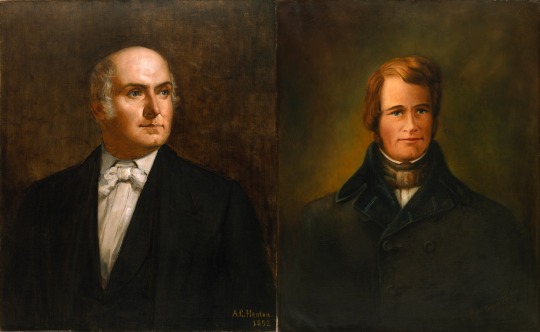
[Secretary of State Abel Upshur and Secretary of the Navy Thomas W. Gilmer, who were both killed by the explosion on Feb. 28, 1844.]
The smoke-filled deck of the Princeton was covered with blood, dismembered limbs, dead bodies, and stunned survivors, many of whom had been wounded by pieces of red-hot, iron shrapnel from the gun or pieces of human beings torn apart by the explosion. Throughout the ship, ears were ringing and people were rendered temporarily deaf by the sound of the blast. Below decks, the women who had accompanied the Princeton awaited more news from above, which quickly trickled downstairs. Someone yelled, "The Secretary of State is dead!" and the news did not improve. When Julia Gardiner found out that her father was among those who had been killed in the blast, she fainted -- directly into the arms of President Tyler. Dolley Madison, who had seen much in her 75 years -- during the War of 1812, she barely escaped the White House shortly before British forces captured Washington and burned the Capitol and the Presidential Mansion -- was certainly stunned by the tragedy aboard the ship, but she quickly did her best to comfort the Princeton's passengers who were shaken and distressed.
As the USS Princeton limped back to Washington, D.C., John Tyler comforted Julia Gardiner as best as he could. For the President, his pleasure cruise with the woman he hoped to marry and her wealthy father could not have gone worse. Now, David Gardiner was literally laying in pieces on the deck of the Princeton as Tyler -- who was also returning to Washington without a Secretary of State or Secretary of the Navy -- tried to console Gardiner's young daughter, but she remained unconscious until the ship arrived back in Alexandria, Virginia.
When the Princeton arrived at Alexandria, President Tyler physically carried Julia Gardiner from the wounded warship. On the gangplank, Julia finally awakened in the President's arms, and as she later said, "I struggled so that I almost knocked both of us off the gangplank. I did not know at the time, but I learned later it was the President whose life I almost consigned to the water." President Tyler had Julia taken directly to the White House where she spent the next few days recuperating under the watchful eyes of the President and his large family.
The bodies of Julia's father, the two dead Cabinet members (Secretaries Upshur and Gilmer), the Princeton's Commander Kennon, and the diplomat Maxcy remained on board the Princeton on the night of February 28th. The injured went to hospitals and homes around the capital city. The next day, Washington was in official mourning as the word of the tragedy spread and the signs of mourning -- black crepe hanging on the White House and other public buildings --were displayed. As Washington mourned, the bodies of Gardiner, Upshur, Gilmer, Kennon, and Maxcy were transported to the White House, where their flag-draped caskets rested in honor in the East Room. (It's safe to assume that President Tyler's slave wasn't awarded the same honors -- when the bodies were removed from the Princeton, they were all placed in magnificent mahogany caskets, except for Armistead, who was placed in one made from cherry. The President did reportedly give Armistead's mother $200.)
After two days of lying in state in the East Room of the White House, Gardiner, Upshur, Gilmer, and Kennon were transferred to St. John's Episcopal Church, where all of official Washington showed up to pay their respects at their joint funeral (Maxcy's family took his remains for a private funeral and burial shortly after his body arrived at the Executive Mansion). It was a solemn occasion -- one of the biggest tragedies to strike the United States up to that point, and a significant loss to President Tyler, both professionally and personally. Tyler was mourning two important members of his Cabinet, and the woman he hoped to marry was burying her father after he had been killed in the most gruesome manner imaginable on a cruise that Tyler had invited him to take.
The funeral started with an ominous and unfortunate signal: the firing of loud artillery across from the Executive Mansion could not have been a pleasant reminder to those who had survived the tragedy on board the Princeton a few days earlier. The bodies of Upshur, Gilmer, Kennon, and Gardiner were taken to Congressional Cemetery following the funeral and buried there, although Gardiner was later exhumed and reburied on Gardiner's Island in New York. After narrowly escaping death or serious injury on the Princeton a few days earlier, President Tyler found himself in danger once again as he left the funeral. Traveling through the busy streets of Washington in his horse-drawn carriage, the President's horses were startled by the crowds and bolted -- leaving Tyler helpless in a runaway carriage until a man bravely rushed out from a hotel entrance and helped stop the carriage.
••• Being comforted by President Tyler and his immediate family in the aftermath of her father's death changed Julia Gardiner's mind about marrying the much older President. Tyler had done everything possible to console her and make her feel safe in the days after the Princeton explosion. Later, Julia would write that, "After I lost my father, I felt differently towards the President. He seemed to fill the place and to be more agreeable in every way than any younger man was or could be." While the loss of her father was certainly tragic, John Tyler happened to be in the right place at the right time, and, in a strange way, David Gardiner's death may have helped spark the romance between the President and Gardiner's daughter. Several weeks after the Princeton tragedy, Tyler asked Julia's mother (who herself was nearly a decade younger than the President!) for her blessing to marry Julia and Mrs. Gardiner approved of the union.
Still, the marriage was not without controversy. The wedding took place on June 26, 1844, just a few months after the Princeton explosion. Julia and her family were still in mourning for Mr. Gardiner, so the wedding was solemn and low-key. Plus, the President's family -- particularly his daughters from his first marriage -- were reluctant to accept his new bride. After all, Tyler's first wife had died less than two years earlier, and Julia Gardiner was about the same age as Tyler's daughters; in fact, she was five years younger than Tyler's oldest daughter. One more unique aspect of the wedding was that this was the first time an incumbent President of the United States had ever gotten married while in office. Normally, it would be blockbuster social news, but the President's wedding was kept strictly private.
Accompanied only by his son, John Tyler III, the President and Julia Gardiner were married at the Church of the Ascension in Manhattan (which is still standing today, at Fifth Avenue and Tenth Street in Greenwich Village) on June 26, 1844. Very few people even knew that the President was in town until after the wedding when they heard the salute from the guns of warships in New York Harbor as he and his new First Lady departed the city (again, maybe firing the guns wasn't the greatest idea for this particular couple at that particular time?). According to one of the only eyewitness accounts of the wedding, published in The New York Morning Express the day after the nuptials, the bride was given away by her brother and and "robed simply in white, with a gauze veil depending from a circlet of white flowers wreathed in her hair." After the ceremony, the wedding party held a dinner at Lafayette Place before the President and Mrs. Tyler departed the city by steamer, staying the night in Philadelphia, before proceeding back to Washington on a special train the next day.
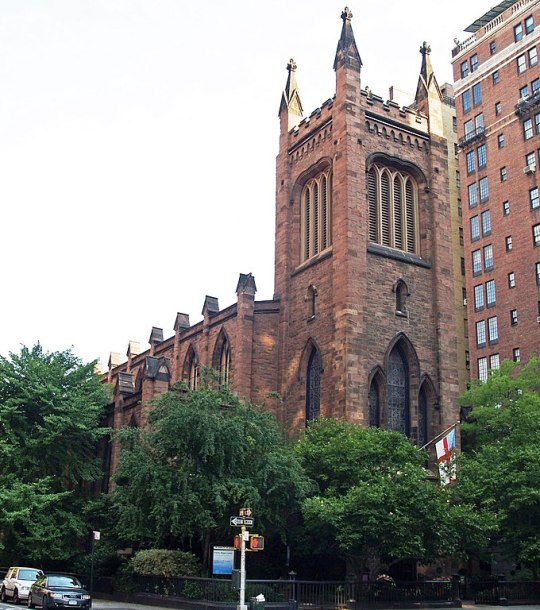
[The Church of the Ascension in Manhattan where President Tyler and Julia Gardiner were married on June 26, 1844.]
When President Tyler left office in 1845, he and his wife retired to Tyler's plantation in Virginia, Sherwood Forest. They had seven children (in addition to the seven surviving children from Tyler's first marriage) and remained happily married, despite the 30-year age difference between the husband and wife. In January 1862, the Tylers headed to Richmond for Tyler's inauguration as a member of the Confederate House of Representatives. Tyler was the only former President who did not remain loyal to the Union during the Civil War. On January 18th, the 71-year-old Tyler died in Richmond's Exchange Hotel, likely due to complications from a stroke and was buried in Richmond's Hollywood Cemetery with Confederate honors. Widely considered a traitor in the North, official notice of Tyler's death wasn't given until 1915 when Congress finally erected a monument near his grave.
Julia Gardiner Tyler lived until 1889, but remarkably, as of 2024, one of President and Mrs. Tyler's grandsons is still living. With seven children (the last of which died in 1947 -- 157 years after John Tyler's birth!), the Tylers were blessed with a wealth of grandchildren and Harrison Ruffin Tyler (born in 1928) is still alive today (his brother, Lyon Gardiner Tyler Jr., died in 2020). In the 1970s, Harrison Tyler purchased and restored his grandfather's beloved Virginia plantation, Sherwood Forest, and often spoke about his family's unique place in history until his health started to fail in recent years.
••• As for the USS Princeton, well, it never truly recovered from the "Peacemaker" explosion. Captain Robert Field Stockton was absolved of blame for the tragedy and went on to fame in California during the Mexican-American War (he has a city named after him near Sacramento), and later was elected a United States Senator from New Jersey. The Princeton participated in engagements in the Gulf of Mexico during the Mexican-American War, but its hull was found to be rotting after the war ended. It was broken up for scrap in Boston and the "Peacemaker's" twin gun -- the "Oregon" -- can be seen today on the grounds of the United States Naval Academy in Annapolis, Maryland.
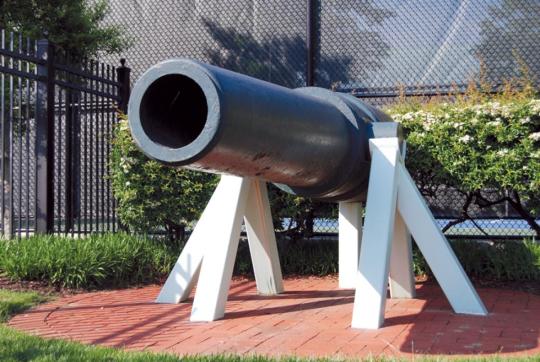
[The "Oregon" gun from the USS Princeton, now on display at the United States Naval Academy in Annapolis, Maryland.]
During World War II, a new USS Princeton was commissioned. A 622-foot-long aircraft carrier, the new Princeton engaged in action in the Pacific Ocean. On October 20, 1944 -- 100 years after the explosion of the "Peacemaker" during President Tyler's Potomac River cruise -- the modern Princeton was attacked by a Japanese dive bomber in the Leyte Gulf and 108 sailors were killed. Even the Princeton's descendants seem to be cursed.

#History#USS Princeton#USS Princeton Explosion#John Tyler#President Tyler#Tyler Administration#Julia Gardiner Tyler#David Gardiner#First Ladies#First Families#Presidential Marriages#Presidential Relationships#Robert Field Stockton#Abel Upshur#Politics#Political History#Military History#WWII#Dolley Madison#Thomas W. Gilmer#Tyler Family#Cabinet of John Tyler#Tyler Cabinet#Presidential History#Presidential Politics#Princeton Explosion#1844 Explosion of the Princeton#U.S. Navy#Naval Accidents#U.S. Naval History
22 notes
·
View notes
Text
all the presidents (+a first lady) that have been in my dreams so far:
franklin pierce (3 times)
jane pierce (1 time)
theodore roosevelt (1 time)
millard fillmore (1 time)
john tyler (1 time, in which he threw me off of a staircase)
james k polk (1 time)
andrew jackson (1 time)
jimmy carter (1 time)
woodrow wilson (briefly mentioned)
#us presidents#presidents#also tyler if you are reading this WHY DID YOU DO THAT TO ME#i am scared and confused at the amount of times franklin pierce has appeared in my dreams
25 notes
·
View notes
Text

Why’d they yassify him
24 notes
·
View notes
Text
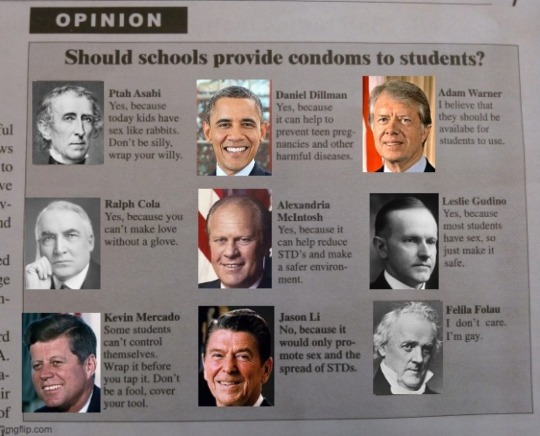
Something I made ages ago
#presidents#john tyler#barack obama#jimmy carter#warren g harding#gerald ford#calvin coolidge#john f kennedy#ronald reagan#james buchanan
68 notes
·
View notes
Text
This election is about the future. Our fates are in our hands. The decision we make in a few days will dictate the next 30 or more years of our lives. Do we want a man who will continue his enrichment of the rich, his patronizing of the poor, his vendetta on his verdicts, the continued marginalization of the middle class, his crusade against the constitution, trampling of the truth, destroying of democracy,lessening of our liberties, his assault on the dream of ordinary Americans.
Or would we want a woman who’s life’s work has been to service, who’s been protecting the people, standing up for the small, prosecuting the predators, helping the helpless, finding the forgotten, bravely busting the big banks, litigating against the lawless, in her quest to defend democracy, restore our republic, assure our allies, frighten and frustrate our foes, expand our economy, curb the corruption, pursue progress, move the middle class more towards financial independence, together with her tenacity, forever fighting for freedom , for us, unified once again as the people of the United States of America!!
The choice is ours…
#brian tyler cohen#election 2024#vote blue#kamala harris#politics#traitor trump#donald trump#republicans#kamala for president#vote kamala#kamala 2024#harris waltz#harris walz 2024#trump is a threat to democracy#trump 2024#freedom#liberty#democracy#progressive#the left#gop#hope#we the people#vote democrat#women voters#vote vote vote#go vote#the constitution#america#american people
17 notes
·
View notes
Text
OMG: Elon Musk pulls INSANE stunt against Bernie and AOC
youtube
#stop the oligarchy#oligarchy#oligarcas#brian tyler cohen#youtube#aoc#bernie sanders#alexandria ocasio cortez#denver#colorado#rally#us politics#elongated muskrat#president musk#eat the rich#fuck elon#billionaires#kleptocracy#american democracy
6 notes
·
View notes

